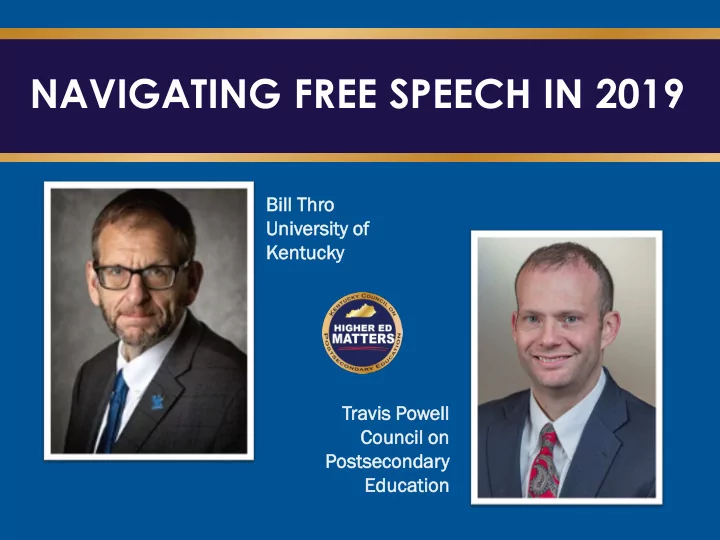

NAVIGATING FREE SPEECH IN 2019 Bil ill l Thro University y of Kent ntuc ucky Tr Travis Powell Counc uncil l on Postsecondary y Educatio ion
Public Universities • Are Constitutional Actors • Are Subject To The Limitations Of The First Amendment • Do Not Have The Discretion To Regulate Expression That The Private Sector Enjoys
Topics Covered I. Freedom Of Speech Overview II. Employees III. Students IV. Open Spaces V. Board Obligations
I. Freedom of Speech • No “Hate Speech” Exception • Narrow Categorical Exceptions • Broad Protections For Employee Speech In Personal Capacity • Broad Protections For Student Speech
Cases Protecting “Hate Speech” • Snyder v. Phelps —Protests At Military Funerals • Matal v. Tam —Trademark Of A Racial Slur • Iancu v. Brunetti —Trademark Of “Immoral” Or “Scandalous” Trademarks
Narrow Categorical Exceptions • Incitement To Violence • True Threat • Harassment (By Inference) • Fighting Words
Incitement to Lawless Action • Advocacy Of The Use Of Force Or Of Law Violation Where Such Advocacy Is Directed To Inciting Or Producing Imminent Lawless Action And Is Likely To Incite Or Produce Such Action
True Threat “True Threats” Encompass Those Statements Where The Speaker Means To Communicate A Serious Expression Of An Intent To Commit An Act Of Unlawful Violence To A Particular Individual Or Group Of Individuals.
Threat Must Be Intended • Fact Someone Feels Threatened Or A “Reasonable Person” Would Feel Threatened Is Not Enough • Speaker Must Intend The Threat Or Know That It Would Be Perceived As A Threat
Harassment • Supreme Court Has Held That Public Schools And Universities Are Liable For Harassment. • Therefore, We Can Infer That Harassment Is Not Protected.
Harassment Definition Conduct That Is So Severe, Pervasive, And Objectively Offensive That It Can Be Said To Deprive The Victims Of Access To The Educational Opportunities Or Benefits
Fighting Words Those Personally Abusive Epithets Which, When Addressed To The Ordinary Citizen, Are, As A Matter Of Common Knowledge, Inherently Likely To Provoke Violent Reaction.
II. Employees • Personal Capacity v. Employee Capacity • Academic Freedom
Private Capacity v. Professional Capacity • Private Capacity—All Public Employees Have A First Amendment Right To Speak On Matters Of Public Concern. • Employment Capacity—Public Employer Can And Does Dictate Speech. Public Employee Can Be Disciplined For Speech Made In Their Employment Capacity.
Academic Freedom • Faculty Like To Talk About Individual Academic Freedom • Supreme Court And Sixth Circuit Case Law Says Faculty Have The Same Rights As Other Public Employees. No Greater And No Less. • Institution May Choose To Give Greater Academic Freedom To Faculty
III. Student Groups • Recognition • Funding • Right Of Association • Religious Groups
Recognition • Public University Must Recognize Student Organizations Regardless Of The Viewpoint Advocated. • No Establishment Clause Violation When Public University Recognizes Religious Organization. - 17 -
Funding • If Public University Provides Funding, It Must Provide Funding For All—Regardless Of Viewpoint Advocated. • No Violation Of The Establishment Clause To Fund Student Religious Organizations • Distribution Of Fees Must Be Viewpoint Neutral - 18 -
Right of Association • There Is A Right To Associate Together For Expressive Purposes. • There Is A Right For A Group To Exclude Those Who Disagree With The Group’s Aim. - 19 -
Religious Groups • State Law Gives Religious Groups The Right To Exclude Those Who Do Not Share The Faith. • State Religious Freedom Restoration Act • Campus Free Speech Act
IV. Open Spaces • State Law Says All Open Space On Campus Is A “Traditional Public Forum” For Students And Faculty. • State Law Prohibits Free Speech Zones
Time Place and Manner Restrictions • Reasonable • Justified Without Reference To The Content Of The Regulated Speech • Narrowly Tailored To Serve A Compelling Governmental Interest, And • Limited To Provide Ample Alternative Options For The Communication Of The Information
Examples of Acceptable Restrictions • No Amplification • No Blocking Of Pedestrian Traffic • No Open Flames • No Demonstrations Between Certain Hours • Some Areas May Be Reservation Only
V. Board Obligations
2019 Campus Free Speech Act • Board Must Adopt Policies Guaranteeing First Amendment Rights • Private Right Of Action And Damages To Enforce The Act (No Immunity) • Policies Must Be Communicated To The University Community • Cannot Disrupt The Speech Of Others
Guidance • Consult Your Campus Counsel • Make Sure You Understand The Issues Before You Act • Make Sure Your Administrators Are Knowledgeable About Free Speech
Questions?
The Scenarios
Recommend
More recommend